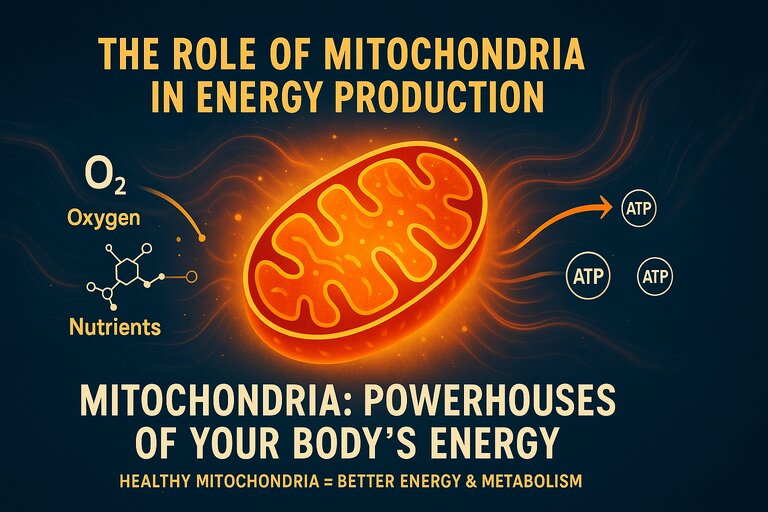
Mitochondria are the powerhouses of the cell—they're crucial for optimal health , says leading biochemist Dr. Sarah Thompson.
Unravel how experts demystify mitochondrial health, revealing how nurturing these tiny energy factories can optimize your well-being and vitality.
Dive into cutting-edge insights that promise to revolutionize your approach to health.
Understanding Mitochondrial Health
What Are Mitochondria?
Mitochondria are tiny organelles found within virtually every cell of the human body. Often described as the "powerhouses" of cells, they play a critical role in converting the energy from food into a usable form: ATP (adenosine triphosphate).
This process is vital for cellular function, activity, and overall health. The efficiency and health of mitochondria directly influence our energy levels, metabolic rate, and even long-term health outcomes.
With hundreds of thousands of mitochondria present in each cell, especially in energy-dependent organs like the heart and brain, maintaining their health is essential for overall well-being.
The Role of Mitochondria in Energy Production
The primary function of mitochondria is to produce ATP through a complex process known as oxidative phosphorylation.
This process involves the combination of oxygen and nutrients derived from the food we consume, leading to energy production necessary for various bodily functions.
Mitochondrial health is crucial because damaged or dysfunctional mitochondria can lead to fatigue, metabolic disorders, and other health issues.
For more insights on combating fatigue, explore our article on Chronic Fatigue: Discover Causes and Solutions for Lasting Energy .

Understanding mitochondrial health begins with visualizing their inner workings, which highlight their crucial role in energy production.
“Mitochondrial dysfunction is at the core of virtually every chronic disease we face today.”
— Dr. Terry Wahls , Clinical Professor of Medicine, University of Iowa
Dr. Wahls emphasizes how crucial mitochondrial health is.
When mitochondria don’t function well, it can lead to diseases like diabetes, Alzheimer’s, heart disease, and more.
Supporting your mitochondria through good nutrition, exercise, and stress reduction can play a major role in long-term health.
Common Causes of Mitochondrial Dysfunction
Environmental Toxins and Their Impact
Exposure to environmental toxins is one of the foremost contributors to mitochondrial dysfunction.
These toxins can undermine the delicate processes within the mitochondria, leading to reduced energy production and enhanced oxidative stress.
Examples include pollution, heavy metals like mercury, and industrial chemicals.
Reducing exposure to these harmful substances is crucial for preserving mitochondrial health and, by extension, energy levels and overall wellness.
Nutritional Deficiencies Affecting Mitochondrial Function
Nutritional deficiencies can severely impact mitochondrial health. Essential nutrients, such as B vitamins, magnesium, and omega-3 fatty acids, are vital for mitochondrial function.
Insufficient intake of these nutrients can lead to impaired energy production and increased susceptibility to diseases.
Ensuring a balanced diet rich in these critical nutrients is fundamental to maintaining healthy mitochondria.
Consider reading about the benefits of creatine supplementation for additional support in energy production.
“Energy is life—and mitochondria are the engines. Without enough energy, nothing in your body works well.”
— Dr. Robert Naviaux , Professor of Genetics, UC San Diego
Dr. Naviaux is pointing out the basic truth: every cell in our body needs energy to perform its function, and that energy comes from mitochondria.
When energy is low due to mitochondrial issues, it affects everything from brain clarity to immune function to physical strength.
Stress and Its Effects on Mitochondria
Chronic stress can have detrimental effects on mitochondrial health, leading to fatigue and decreased energy levels.
Stress hormones can disrupt mitochondrial function, affecting their performance in energy production.
Incorporating stress management techniques is vital to improve both mental health and mitochondrial efficiency.

Identifying the common causes of mitochondrial dysfunction can empower individuals to make informed choices and take proactive steps towards maintaining their energy levels.
Expert Insights on Improving Mitochondrial Health
Dietary Changes for Mitochondrial Support
Experts emphasize the critical role of nutrition in supporting mitochondrial health. Making informed dietary choices can significantly improve energy production and enhance overall health.
A nutrient-rich diet focused on whole foods is essential. Foods that are high in antioxidants and phytochemicals can help mitigate oxidative stress in the mitochondria and support their function.
Foods That Boost Mitochondrial Function
-
Leafy greens (spinach, kale)
-
Fatty fish (salmon, mackerel)
-
Berries (raspberries, blueberries)
-
Nuts and seeds (walnuts, flaxseeds)
-
Whole grains (quinoa, brown rice)
Supplements for Mitochondrial Repair
In addition to a healthy diet, specific supplements can support mitochondrial function.
Coenzyme Q10, alpha-lipoic acid, and acetyl L-carnitine are recommended for their role in energy production and antioxidant capabilities.
Consultation with a healthcare provider to tailor supplementation can optimize mitochondrial health.

Choosing the right foods not only supports mitochondria but also enhances overall vitality and wellness.
Exercise and Mitochondrial Biogenesis
Engaging in regular physical activity is one of the most potent ways to boost mitochondrial health.
Exercise stimulates mitochondrial biogenesis, the process through which new mitochondria are formed within cells, enhancing energy production capacity.
High-intensity interval training (HIIT) and aerobic exercises are especially beneficial in promoting mitochondrial efficiency.

Regular exercise can improve mitochondrial function, leading to increased energy levels and overall well-being.
“Exercise is like a mitochondrial tune-up—it boosts their number and function.”
— Dr. David Sinclair , Professor of Genetics, Harvard Medical School
Dr. Sinclair’s research on aging shows that exercise doesn't just build muscles—it also signals your body to make more mitochondria and keep the existing ones healthy.
This helps your body produce energy more efficiently and stay youthful longer.
Lifestyle Modifications to Enhance Energy Levels
Stress Management Techniques
Managing stress effectively can lead to significant improvements in mitochondrial health.
Mindfulness practices, yoga, and meditation can help regulate stress levels, balancing the hormones that negatively impact metabolically active mitochondria.
Implementing regular stress-reduction strategies can be instrumental in maintaining mitochondrial health.
Importance of Sleep for Mitochondrial Health
Adequate and quality sleep is essential for optimal mitochondrial function. Sleep allows for cellular repair processes, including the restoration of mitochondrial efficiency.
Establishing good sleep hygiene practices can help ensure restorative sleep, thereby benefitting mitochondrial health.
Mindfulness and Relaxation Practices
Incorporating mindfulness and relaxation practices into daily routines can protect mitochondrial health by reducing stressors that negatively affect energy production.
Engaging in activities such as deep breathing, progressive muscle relaxation, or even listening to music can enhance overall well-being. For additional wellness strategies, explore the potential benefits of red light masks in promoting relaxation and health.

Mindfulness practices may provide a dual benefit—enhancing mental well-being and supporting mitochondrial health.
“The mitochondria respond to the environment. Toxins, stress, poor diet—these can all impair energy production.”
— Dr. Bruce Ames , Biochemist, Senior Scientist at Children’s Hospital Oakland Research Institute
According to Dr. Ames, your environment and lifestyle choices directly influence your mitochondria.
Bad habits or exposure to toxins can reduce mitochondrial efficiency, leading to fatigue and poor health. On the flip side, healthy choices help mitochondria thrive.
People Also Ask
What supplement repairs mitochondria?
Supplements such as Coenzyme Q10, alpha-lipoic acid, and acetyl L-carnitine can help support and repair mitochondrial function.
What foods repair mitochondria?
Foods rich in antioxidants, omega-3 fatty acids, and B vitamins, such as green leafy vegetables, fatty fish, nuts, and seeds, are instrumental in supporting mitochondrial health.
What is the best exercise to increase mitochondria?
High-intensity interval training (HIIT) and aerobic exercises are among the best for stimulating mitochondrial biogenesis, leading to increased mitochondrial density.
What is the life expectancy of a person with mitochondrial disease?
Life expectancy can vary widely among individuals with mitochondrial disease, depending on the specific type and severity of the condition. Some may live full lives, while others may face serious health challenges.
Key Takeaways
-
Mitochondrial health is vital for energy production and overall vitality.
-
Environmental toxins, nutritional deficiencies, and stress can negatively impact mitochondrial function.
-
A diet rich in whole foods and specific supplements can support mitochondrial repair and health.
-
Regular exercise boosts mitochondrial biogenesis and enhances efficiency.
-
Stress management and quality sleep are essential for mitochondrial function.
Conclusion
Incorporating expert insights on mitochondrial health can profoundly impact your energy levels and overall health.
By understanding the role of mitochondria and taking actionable steps to nourish these energy powerhouses, individuals can reclaim vitality and wellness.
Remember, small, consistent changes in diet, lifestyle, and exercise can lead to significant improvements over time.
Embrace the journey towards better mitochondrial health for a happier, more energetic life.
Call to Action
Explore more about mitochondrial health and discover your potential for increased energy and vitality. For tailored guidance, consider consulting a healthcare professional to assess your mitochondrial health and create a personalized plan.
 Add Row
Add Row  Add
Add 




 Add Row
Add Row  Add
Add
Write A Comment